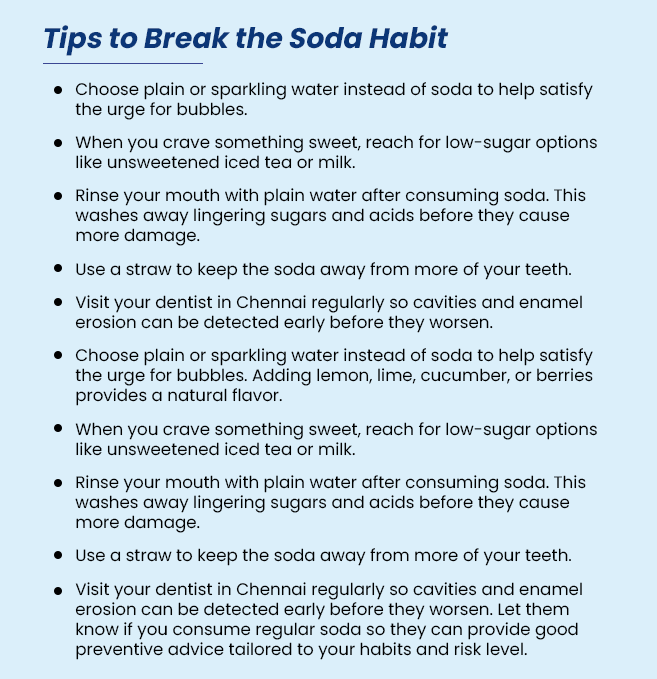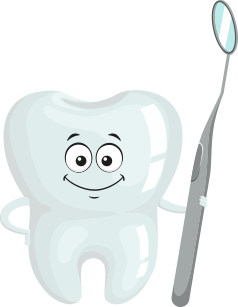Effects of Carbonated Drinks on Teeth & Oral Health

Sugary sodas can take a toll on your dental health. The high sugar content interacts with the bacteria in your mouth, putting you at risk for cavities, staining, and other issues. Additionally, the acids in soda wear away at tooth enamel, leaving you vulnerable to decay. Understanding the effects of soft drinks on teeth can help you make informed choices to protect your smile.
So, in this blog, let’s understand soda effects on dental health and some tips to break soda habits for better oral health.
Soda Leads to More Cavities
Each time you sip a sugary soda, the sugar interacts with bacteria in your mouth. This creates an acid that erodes tooth enamel and allows decay to set in quickly. The longer the sugary liquid stays on your teeth, the more damage that occurs. Over time, small cavities develop and grow larger, potentially requiring fillings or other dental work down the road. The more frequently you drink soda, the greater your risk of tooth decay.
Acid Erodes Tooth Enamel
In addition to sugar, soda contains acid ingredients like phosphoric, citric, and carbonic acid. This acid directly wears away the hard outer covering of your teeth, called enamel. Thinner enamel allows decay to take hold more easily. The acids also make your teeth more sensitive, especially to hot and cold foods or beverages. Carbonated drinks damage teeth and enamel permanently and can’t be reversed.
Dark Colas Discolor Teeth
The dark caramel coloring in colas like Coke, Pepsi, and other brown sodas contains staining elements. Over time, this material penetrates the porous enamel of your teeth, leaving unattractive discoloration. The stains are difficult to remove with normal brushing and may require professional whitening treatments. Giving up dark sodas prevents additional discoloration.
Diet Soda Also Poses Threats
Although diet sodas are lower in sugar, the acidity still wears away enamel over time. Artificial sweeteners like aspartame don’t cause cavities themselves but may increase the risk. Bacteria feed on tiny food particles stuck to your teeth. When you drink diet soda, your saliva production increases temporarily. Once this dies down, the dry mouth develops, which allows more bacteria and food debris to remain on teeth.
Oral Health Complications
Frequent soda drinking not only harms your teeth but can also lead to other oral health issues. Acids in soda erode gum tissue, making periodontal disease more likely. Tooth loss, bad breath, and mouth sores are other possible side effects. Because soda limits healthy saliva flow, your mouth becomes less able to fight off bacteria and infections overall.
Tips to Break the Soda Habit
Limiting or eliminating regular soda drinking is the best way to protect your pearly whites. Consider these helpful tips:

- Choose plain or sparkling water instead of soda to help satisfy the urge for bubbles. Adding lemon, lime, cucumber, or berries provides a natural flavor.
- When you crave something sweet, reach for low-sugar options like unsweetened iced tea or milk.
- Rinse your mouth with plain water after consuming soda. This washes away lingering sugars and acids before they cause more damage.
- Use a straw to keep the soda away from more of your teeth.
- Visit your dentist in Chennai regularly so cavities and enamel erosion can be detected early before they worsen. Let them know if you consume regular soda so they can provide good preventive advice tailored to your habits and risk level.
The Bottom Line
Soda may taste delicious, but it’s high sugar content and acidity wreak havoc on your dental health. Cavities, enamel erosion, discolored teeth, and other issues are common effects of soft drinks on teeth. Limiting sugary and acidic soft drinks protects your smile in the long run. Pay attention to what you put in your mouth, or else risk losing your precious teeth. Choosing healthier alternatives like water allows you to quench your thirst without all the harm.
And if you are looking for the best treatment for getting rid of the effects of soda on your teeth, Radiant Dental Care is the best dental hospital in Chennai. They have an expert team of dentists who can help you make your teeth perfectly white and give you tips on how to keep them healthy. Book an appointment to learn more.
FAQs
Why are sodas bad for my teeth?
Sodas are bad for your teeth because they contain a lot of sugar that interacts with the bacteria in your mouth to produce acids. These acids can dissolve the enamel surface of your teeth, making them more vulnerable to cavities and decay.
Can drinking soda cause me to lose my teeth?
Yes, drinking too much soda can increase your risk of losing teeth. The combination of sugar, acid, and carbonation wears down your enamel. As the enamel disappears, decay can spread more rapidly. This decay reaches the inner structures of your tooth and can eventually cause infections and tooth loss if left untreated.
Is diet soda better than regular soda for dental health?
Diet sodas are lower in sugar, so they don’t cause cavities directly. However, the high acid content still erodes tooth enamel in the long run. Diet sodas are acidic due to added citric and phosphoric acids. So, while diet sodas are a lower risk, they can still contribute to enamel erosion and dental sensitivity over time with frequent consumption.
How can I drink soda safely?
If you choose to drink soda occasionally, some safety tips include drinking soda with a straw to reduce contact with your teeth, rinsing your mouth with water after drinking soda to wash away acid, waiting at least 30 minutes before brushing to allow your enamel to re-harden, choosing lighter colored sodas to prevent stains and drinking soda with meals instead of sipping throughout the day.
What are better alternatives to sodas?
Some healthy alternatives to soda include water with lemon or lime, unsweetened iced tea, low-fat milk, fruit-infused sparkling water, smoothies with yogurt or milk, or vegetable juices. These provide hydration and nutrients without the high amounts of sugar, acids, and carbonation that damage dental health.

 +91 9513446186
+91 9513446186
